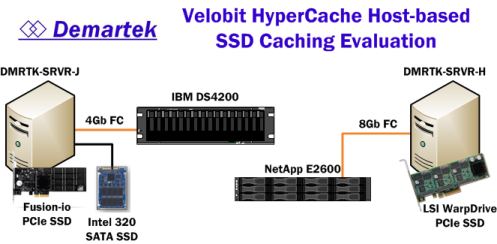Demartek Evaluation of VeloBit SSD Caching Software
11 July 2012
With SSDs taking the enterprise by storm, one way to deploy them is as a cache in front of existing storage. The competition is heating up in the SSD caching marketplace, as vendors both large and small are introducing SSD caching products.
One of these is the VeloBit HyperCache 1.1 SSD caching software. Because it is a host-based software solution, it can work with any SSD in any form factor, including PCIe cards and disk-drive form factor SSDs. HyperCache is based on optimization techniques applied in four areas:
- Content Locality Caching, which caches data blocks based on the “popularity” of their contents
- In-line compression that uses a “similarity detection” algorithm
- A horizontal architecture that allows data that is not cached to bypass the SSD, minimizing SSD writes
- A conservative insertion protocol that places data blocks on the SSD in such a way as to minimize wear, extend the life of the SSD and improve performance
VeloBit commissioned Demartek to evaluate its HyperCache 1.1 SSD caching software in the Demartek lab in Arvada, Colorado, measuring its performance in Linux and VMware environments. These performance tests were conducted with two different PCIe SSDs and a SATA-interface SSD. These SSDs included a Fusion-io ioDrive, LSI WarpDrive and an Intel 320 SSD. The back-end storage included two Fibre Channel storage systems: an IBM DS4200 and NetApp E2600.
VeloBit HyperCache 1.1 performed very well in our lab tests, especially when it was caching both reads and writes. The performance of VeloBit HyperCache, especially in the read-intensive tests in the native Linux environment, is the highest that we have seen for host-based SSD caching.

|

View the Demartek Evaluation of VeloBit SSD Caching Software (PDF, 428 KB) |

 We are pleased to announce that Principled Technologies has acquired Demartek.
We are pleased to announce that Principled Technologies has acquired Demartek.